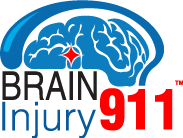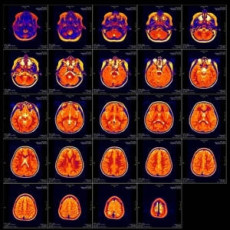Concussion
What is a Concussion?
A concussion is the most minor type of brain injury caused by head trauma. A concussion is a brain injury and is also called an MTBI or Mild Traumatic Brain Injury. A concussion can affect any part of the brain as seen in one image showing the injury to the side of the brain and the other image showing injury to the front of the brain.


A concussion was previously thought to only result in a short loss of normal brain function. It is now understood that it can cause permanent minor loss of normal brain function (see Long Term Effects and the videos below). Although medically minor, the loss of normal brain function can be significant to the patient, particularly because it causes insidious life altering symptoms.
What Causes a Concussion?
Trauma can be caused in an accident by hitting the head against something which shakes the brain and causes it to hit the skull. Both the shaking of the brain and the striking against the skull damages the brain.
Whiplash can also cause a concussion by both shaking the brain and causing it to hit the skull in the same way as if the head hit the ground.
How Do You Know If You Had a Concussion?
While an accident may cause other injuries and scratches, there may be no visible signs of a concussion. This often causes other injuries to be attended to while a concussion is overlooked.
Symptoms of a concussion may start days or weeks after the injury. Symptoms may include a headache or neck pain, nausea, ringing in your ears, dizziness, or tiredness. You may not feel like your normal self for several days or weeks after the injury. See an exhaustive list of concussion symptoms.
If you experience any of the symptoms, you should see a neurologist, neuropsychologist or other doctor for an examination and treatment. If your doctor find a correlation between your symptoms and an accident or other cause of a possible concussion, your doctor will likely order an MRI (see below) to confirm or rule out the existence of any injury to your brain. If confirmed, the next step is treatment which can include mental exercises to force other areas of the brain to complete tasks previously performed by the now damaged area.
Finding Evidence of a Concussion
If a concussion is suspected after an accident or other head trauma, there are new MRI studies which will confirm a hemorrhage was sustained: Susceptibility-Weighted Imaging (SWI), Diffusion -Weighted Imaging (DWI), and Diffusion Tensor Imaging (DTI). Read about these MRI studies and how brain injury can be detected on CT and MRI even long after an accident.
Long Term Effects of a Concussion
People may seem to fully recover after a concussion, but subtle changes are almost always overlooked and may be thought of as just not feeling right. These changes are rarely connected by the injured person with an accident because the symptoms usually occur later on and are only noticed after other acute injuries subside such as a fracture, torn ligament, or neck/back pain.
Even when a hemorrhage is noted on a CT scan in the hospital, the brain injury may go undetected by the patient because of a failure of the hospital staff to communicate the injury to the patient. When an accident victim is brought into a hospital emergency room with a possible head injury, the first consideration by emergency room trauma doctors is the detection of a brain injury and making sure that any brain damage is minimized and death is prevented. Once the condition has stabilized and there is no further danger, the injury is literally forgotten and patients are often not told to follow up with a neurologist.
Weeks or months later, the injured person may start to realize they are experiencing some of the symptoms associated with a concussion or brain hemorrhage but not understand why these symptoms are occurring. The failure to connect these symptoms to an accident, often results in the injury going undiagnosed and untreated. While brain injury is permanent, treatment is available to train the brain to utilize other areas to accomplish tasks previously accomplished by the injured area.
The Face of Concussion — Invisible wounds of war | 60 Minutes
The Concussion Legacy Foundation (Formerly Sports Legacy Institute) protects athletes and families through research, policy, and education about concussions in sports, especially football and soccer.
What Happens To The Brain During A Concussion?
Demonstrated by Dr. Giza at UCLA

